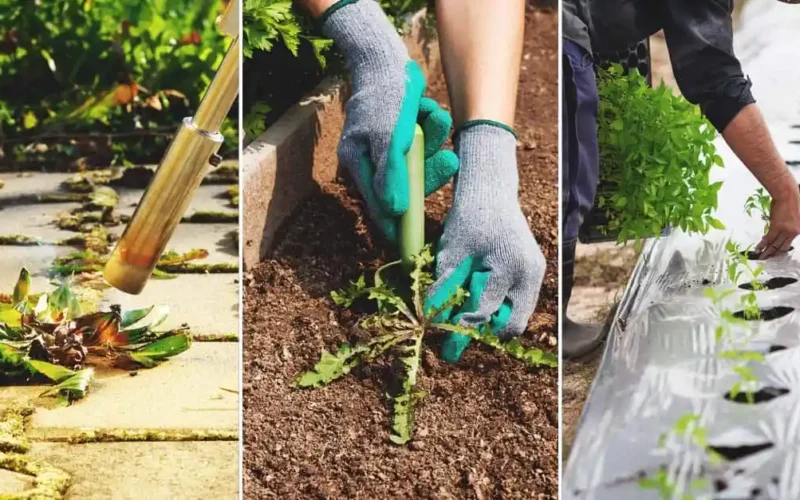Have you ever tackled stubborn weed grow overnight? Read our comprehensive guide on how to control weeds without using harmful chemicals.
Understanding Weeds
The first thing you should understand is the nature of weeds. Weeds grow between your garden plants where they are most likely unwanted. Weeds will usually fight with your desirable plants for sunlight, water, and nutrients which weakens your greenery.
There are some beneficial sides of weeds. Clover and dandelions add nitrogen which improves the soil’s qualities and other weeds provide food and shelter for beneficial insects.
So, If you don’t control them, they can quickly invade your garden and kill your cultivated plants.
Soil Health and Fertility
Maintain healthy soil to prevent weeds from growing and spreading in your garden. Compoting, crop rotation and cover cropping are good methods to improve soil health and fertility. These practices will create a less inviting environment for weeds.
For example, compost adds nutrients to the soil and improves its texture. It also makes plants establish strong root systems and fight back for space and nutrients.
Cultural Practices
Proper plant spacing is a way to reduce the competition between plants and take control of weeds. Mulching is an efficient cultural practice for weed control as it retains moisture in the soil and controls seed germination. You can apply straw, wood chips, or shredded leaves throughout the growing season when weeds spread quickly.
Mechanical Control
One of the best ways to deal with weeds is by doing it manually. You will need tools such as hoes, cultivators and weeders to remove the unwanted weeds from the root. Use your hands to pick weeds and protect the garden from uninvited pests.
Integrated Pest Management (IPM) Techniques
IPM combine methods to control weeds with minimal use of chemical pesticides. You can apply different approaches such as biological control, cultural practices and mechanical control.
For example, biological control methods use living creatures such as predatory insects, chickens or goats to reduce the weed population.
Natural Remedies
There are also natural remedies that can quickly eliminate weeds in your garden. Vinegar-based solutions, for example, can be effective at killing weeds without leaving harmful residues in the soil.
You can mix vinegar with a small amount of dish soap. Then, spray the solution directly onto the leaves of the weeds. For the best results, make sure you apply it on a sunny day when weeds are actively growing.
Other natural remedies include boiling water or homemade weed killer that is made from salt or citrus oil. Be cautious with these remedies, as they can also harm other plants if not applied properly.
Long-Term Strategies for Weed Prevention
Prevention is the main key to control weeds. One of the most important long-term strategies is regular garden clearance and maintenance, including weeding, mulching and cultivating. Make sure you keep garden beds well-mulched and have proper spacing between each other. Also, keep all tools and equipment clean and remove any weed debris from the garden to prevent seeds germination.
Community and Shared Resources
Keep yourself informed through local gardening clubs, online forums or social media groups to improve your weed-control skills. It can be very helpful for you to learn from the gardening communities what method works best for weed control and which is not worth it. So, don’t hesitate to search for insights or even share your own knowledge and experience.
Celebrating Diversity and Resilience
Weeds are indeed difficult to control, but they also remind us that in nature, there is always a balance we should accept and appreciate. You should be aware of all the imperfections and still try to foster a healthy garden ecosystem.
Conclusion
We hope this guide provided you with valuable information and insights on how to deal with weeds in your garden without damaging your greenery with harmful chemicals. You should direct your efforts to nurture healthy soil, incorporate mechanical or cultural methods and use eco-friendly methods to create sustainable gardens.











